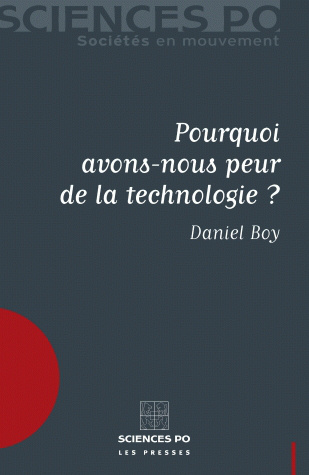Pourquoi avons-nous peur de la technologie ?
First Edition
De l’affaire du sang contaminé à la controverse sur les plantes génétiquement modifiées, quels rapports la société entretient-elle avec la science et la technique ? Read More
From the question of contaminated blood to the ”Mad Cow” crisis, from the asbestos scandal to the controversy over genetically modified produce, numerous crises have affected the relationship society fosters with science and technology.
For the most part, we have not become technophobes. Certain risks are accepted, as the increasing rate of mobile telephone use attests. Others seem to be immediately rejected, which is without a doubt the case with genetically modified crops.
Why does society ignore certain dangers that, according to the experts, have a strong proability of being real? Why does it bluntly refuse others that have an extremely slight chance of coming to bear ?
Following in the footsteps of the sociology of risk, this book poses some essential questions : must we consider the reactions of the public irrational ? How are society’s most cherished opinions spread? Which political strategies can we envision in order to allow a useful confrontation between uninformed depictions of these dangers and risk experts?
Daniel Boy is Director of Research at Cevipof (the Science Po Center of Political Research). Notably, he has published The Biotechnology Debate (with Suzanne de Cheveigné and Jean-Christophe Galloux, Balland, 2002) ; Symposium of Citizens, Instructions for Use (with Dominique Bourg, ECLM, Descartes et Cie, 2005).
Specifications
- Publisher
- Presses de Sciences Po
- Author
- Daniel Boy,
- Collection
- Académique
- Language
- French
- Tags
- ,
- Publisher Category
- > Sociology > Society
- Publisher Category
- > Society
- Publisher Category
- > Sociology
- BISAC Subject Heading
- POL000000 POLITICAL SCIENCE
- Onix Audience Codes
- 06 Professional and scholarly
- CLIL (Version 2013-2019)
- 3283 SCIENCES POLITIQUES
- Title First Published
- 13 November 2007
- Subject Scheme Identifier Code
- Thema subject category: Politics and government
Paperback
- Publication Date
- 01 January 1995
- ISBN-13
- 978-2-7246-0658-4
- Extent
- Main content page count : 278
- Code
- 9782724606584
- Weight
- 430 grams
- List Price
- 31.00 €
- ONIX XML
- Version 2.1, Version 3
Google Book Preview
Contents
CHAPITRE 1 LA RAISON ET L’ÉMOTION OU « LE PUBLIC EST IRRATIONNEL »
La peur des chemins de fer
Le nucléaire : de l’angoisse au débat
Monsanto et la peur de l’inconnu
Aux origines : How safe is safe enough ?
Les experts savent-ils mieux que les profanes ce qu’est le « vrai » risque ?
CHAPITRE 3 L’EFFET CONTAMINATION
« La dose fait le poison », mais tout le monde ne le sait pas
CHAPITRE 4 LES PEURS SONT-ELLES INSPIRÉES PAR DES VISIONS DU MONDE ?
Risque et culture : le regard de l’ethnologue
Valeurs culturelles et perception du risque
Valeurs sociales, idées politiques et risques
Retour à l’histoire : le risque et l’idée de progrès
CHAPITRE 6 HARO SUR LES MÉDIAS
Le passage à l’acte : informer sur le risque technologique ?
Les médias et les journalistes sont-ils des lanceurs d’alerte ?
CHAPITRE 7 NOS ADVERSAIRES SONT DES IGNORANTS
Le modèle démocratique : ceux qui savent sont ceux qui soutiennent
CHAPITRE 8 À QUI FAIRE CONFIANCE ?
CHAPITRE 9 RISQUE ET BONHEUR
Risque contre risque : une vision moderne de la prudence en politique ?
CHAPITRE 10 COMMUNIQUER OU DÉBATTRE

